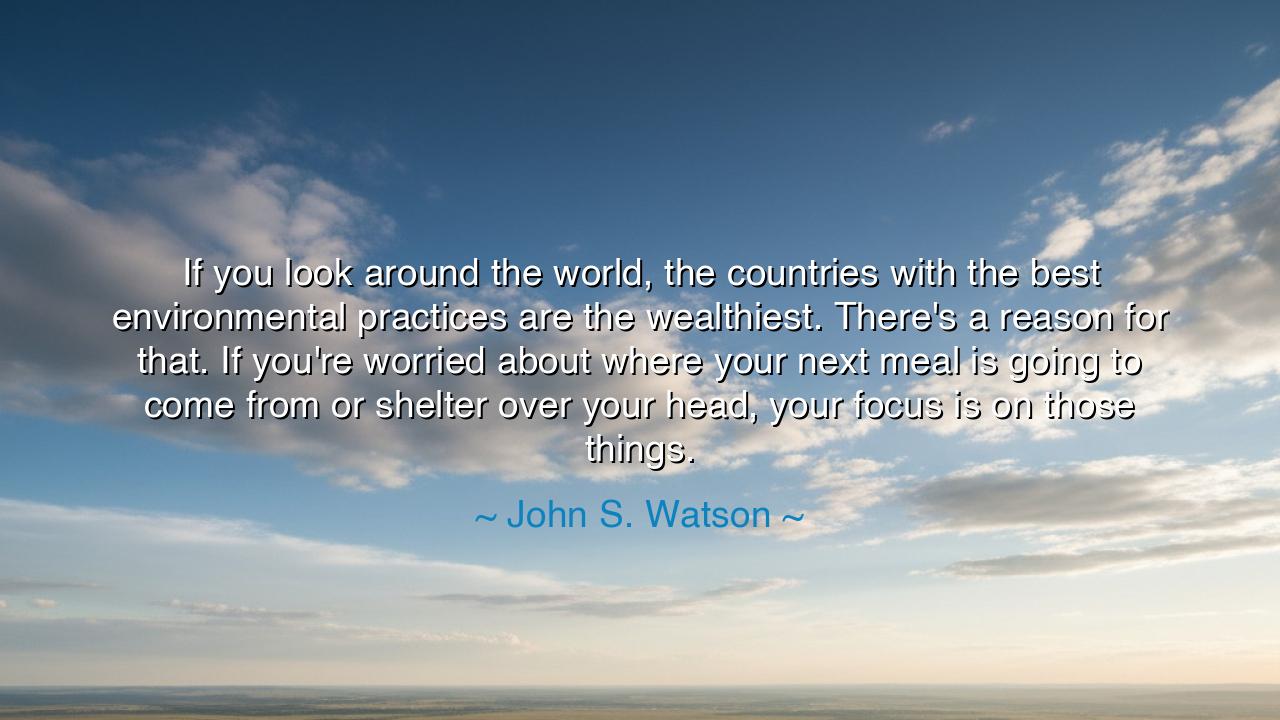
If you look around the world, the countries with the best
If you look around the world, the countries with the best environmental practices are the wealthiest. There's a reason for that. If you're worried about where your next meal is going to come from or shelter over your head, your focus is on those things.






Hear the words of John S. Watson, spoken with the weight of worldly observation: “If you look around the world, the countries with the best environmental practices are the wealthiest. There’s a reason for that. If you’re worried about where your next meal is going to come from or shelter over your head, your focus is on those things.” His words do not condemn the poor, but reveal a truth about human struggle: that before a man can protect forests or rivers, he must first feed his children and secure his dwelling. Survival comes before stewardship, and only when survival is assured can higher duties take root.
The meaning of this saying lies in the hierarchy of human need. A starving family does not think of conserving trees, but of cutting them for firewood. A village without food does not preserve the river, but draws from it until it runs foul. Watson reminds us that wealth—or at least stability—creates the margin in which societies can look beyond the day’s hunger and plan for tomorrow’s earth. Thus, the nations with stronger economies often have the strength to enact laws, to enforce environmental practices, and to pursue the long labor of preservation.
History confirms this truth. In medieval Europe, peasants stripped forests and hunted indiscriminately, not from malice, but from desperation. Conservation, as a practice, arose only later, when kingdoms grew wealthy enough to care for game reserves, forests, and waters. In Japan during the Tokugawa period, a conscious effort to manage forests arose after centuries of deforestation, but it could only take root once order and prosperity allowed people to plan beyond their immediate hunger. So too, in our modern age, wealthier nations often lead in renewable energy, waste management, and conservation, while poorer nations struggle with survival first, leaving little room for broader stewardship.
Yet Watson’s words carry a deeper undertone. For while the wealthiest nations may have the means to practice better environmental protection, they are also often those who consumed the most, polluted the most, and grew rich at the expense of the earth. Their ability to conserve arises not only from foresight, but from the privilege purchased through centuries of industrial expansion. Thus, the words are double-edged: they reveal a truth about need, but they also remind us of responsibility—that those who have caused greater harm are duty-bound to lead in healing.
Consider the example of Costa Rica, a country not among the richest, yet one that chose to prioritize environmental practices despite limited wealth. Through investment in renewable energy, protection of rainforests, and education, Costa Rica transformed itself into a model of sustainability. This shows that while Watson’s principle is often true, exceptions exist: vision, leadership, and values can lift even modest nations to greatness in stewardship. Wealth may make it easier, but wisdom and will can achieve much on their own.
The lesson for us is this: never mock the poor for neglecting the environment, for their battle is survival. Instead, demand that the wealthy, who have the means, shoulder the greater burden of stewardship. And if you yourself are blessed with stability, let your concern extend beyond your own table. Use your security to defend the forests, the rivers, the seas, so that others who are still struggling may one day also inherit a world worth preserving.
Therefore, take action with balance. Feed the hungry, clothe the poor, and shelter the vulnerable, for only then can they join in the labor of protecting the earth. And if you have been granted plenty, use it not for endless consumption, but for preservation, for teaching, for renewal. In this way, prosperity becomes not a selfish possession but a tool of service to all life.
So remember Watson’s words: “The countries with the best environmental practices are the wealthiest.” Let them stir you to compassion, not pride. Let them remind you that survival precedes stewardship, but also that abundance demands responsibility. For the earth belongs not only to the rich or the poor, but to all generations—and only by sharing its burdens wisely will humanity endure.






AAdministratorAdministrator
Welcome, honored guests. Please leave a comment, we will respond soon